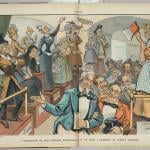“It is a Western conceit,” O’Donovan writes, “to imagine that all political problems arise from the abuse or over-concentration of power; and that is why we are so bad at understanding political difficulties which have arisen from a lack of power, or from its excessive diffusion.” He cites the example of Somalia, admitting that “such power as there has been has, as a matter of course, been abused.” But a more crucial problem is that “political power was never strong... Read more















